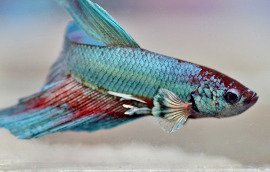 Betta fish are beautiful and fascinating little creatures. The infamous Siamese Fighting Fish are sought after the world over for their striking colours and elaborate fins, making them the second most popular pet fish to goldfish in North America.
Betta fish are beautiful and fascinating little creatures. The infamous Siamese Fighting Fish are sought after the world over for their striking colours and elaborate fins, making them the second most popular pet fish to goldfish in North America.
As far as fish smarts go, bettas are considered very intelligent. They are social fish, and can recognize familiar faces. Bettas can even learn tricks; many will eagerly embrace the opportunity to show them off.
Despite being so popular, the majority of bettas spend their lives in inhumane habitats, and continuously receive improper care. The problem seems to have three components: uneducated consumers, perpetuating erroneous betta myths, and inadequate support from pet stores.
It’s an all-too-common sight: beautiful betta fish for sale, displayed in tiny bowls or plastic cups. They have no environment, stimulation, filtration, or anything that resembles their natural habitat. Over the years, pet stores have bolstered the myth that bettas prefer to live in small spaces. The logic behind the phrase “It’s common for bettas to live in less than an inch of water” is misguided.
In their native Southeast Asia, bettas are regularly found in small puddles around rice paddies. These areas frequently go through periods of flood and drought. While bettas have adapted to survive in small amounts of water, this is certainly not their ideal environment. Before the drop in water level, those small puddles were previously part of a much larger body of water, which was part of a complete ecosystem.
Bettas are hardy fish and can survive in small spaces, but they really need more space to thrive. Small habitats are isolating and stressful, and may shorten a fish’s lifespan. The recommended minimum tank size for bettas is 2.5 gallon. Bettas are not solitary by nature, and can often live peacefully with many species of fish, providing there are no competing male bettas nearby. Bettas can be a visually striking addition to the fish hobbyist’s aquarium.
Consumers are accustomed to seeing what they assume are healthy, happy betta fish in convenient little bowls, especially at certain pet stores. It is then assumed this is a suitable long term habitat. Bettas are generally transported to pet stores in small plastic bags filled with a special blue water mixture containing tranquilizing agents. These drugs help reduce stress and agitation, keeping fish calm while on display for sale. With that said, once a betta is introduced to an environment meeting their needs, their individual personalities will definitely not go unnoticed.
The ideal habitat for bettas requires a few simple items: a tank 2.5 gallons or larger, tank heater and thermometer, gravel, aerator, filter, and low-light plants. You can endlessly customize an aquarium to your taste by using rocks and decorations; bettas love to explore their environment! There are times when your betta will want some alone time away from the action, so it’s best to provide a place for him to hide when needed.
With their stunning colours and unique personalities, bettas make wonderful fish-pets. Who would’ve thought fish could be so much fun?
Brandon Forder – also known as The Pet Expert – is vice-president of Canadian Pet Connection, a family-owned and -operated business located in Meaford. He has over twenty-five years of experience specializing in pet nutrition, behaviour, and healthy pet lifestyles. Canadian Pet Connection is an industry leader committed to providing their clients with the highest levels of personal, attentive service. Learn more at www.CanadianPetConnection.ca.










